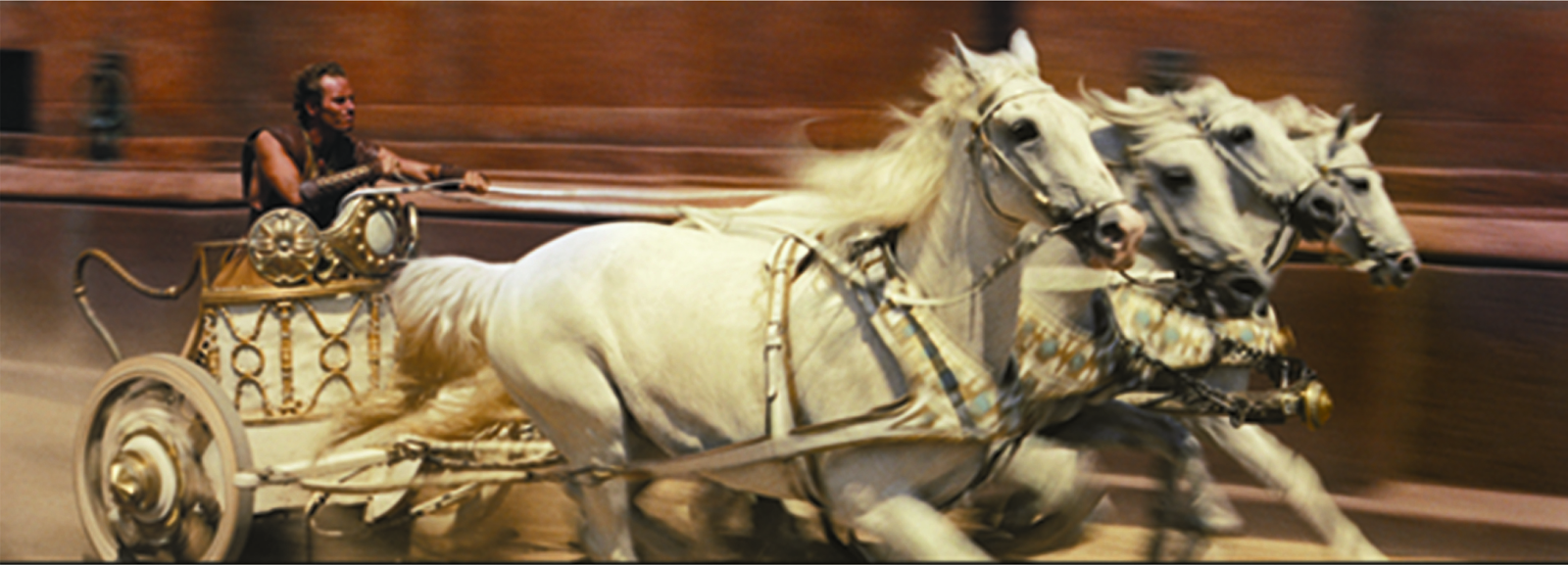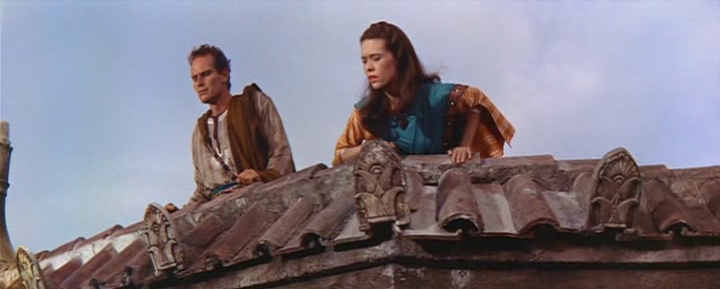On watching Ben-Hur in Bombay, remakes, and the wide-ranging repercussions of a loose tile.
I think I began watching MGM-style historical epics at the New Empire. There was a cluster of three cinemas in the bit of Bombay near my school—Sterling, the New Empire, and the New Excelsior. I have a memory of shamefacedly submitting to The Ten Commandments. These films were shown as reruns in the midseventies, of course, but the crowds were large and easily impressed. I say “shamefacedly” because, even then, I think I was allergic to the genre: the costumes, the sets, the battles, the panoply. To in some way abet such a spectacle seemed beneath one’s dignity at thirteen. When it came to history, my generation was drawn insatiably to the downfall of the Nazis. Biblical stories, given we went to schools with Christian affiliations, weren’t taken seriously. Nevertheless, Dinyar, a boy of superior culture, said gravely (in retrospect, I see his tastes were quite camp), “Have you seen The Ten Commandments? You’re missing something if you haven’t.” So I went to the New Empire and was moved to reluctant tears by the parting of the Red Sea. The cinema and the life I knew had been bereft of miracles, and here was an example of what Dinyar said I’d been “missing,” of what technology and divine intervention could achieve if they chose to. Here, too, I encountered the sculpted, orange-skinned Charlton Heston, who appeared like a plausible link between the vengeful expanse of antiquity and a lithe Californian freedom. Whether I knew him already from Ben-Hur, I can’t say, but I did see Ben-Hur, too, at the New Empire.
In a couple of years, I had forgotten these films. I saw them as inextricable from the comic exuberance, hard-nosed commercial agendas, and faux devotionalism of a particular period and consigned them to a category called DeMille movies. Then I saw Ben-Hur again, probably a decade ago. It might have been shown on TV during Christmas or Easter—it is, after all, as the subtitle of the novel it was based on states, tangentially “a story of the Christ.” I rewatched Ben-Hur as you would pick up a storybook you’d read as a child: to check if its pages amused you in some way. I was also curious, I suppose, about what the chariot race at the end, in which the eponymous hero’s survival skills are displayed at their keenest, would look like on an adult review. My prejudice against the genre had grown more ingrained since I was thirteen, and I was also in fundamental agreement with Roland Barthes that these Hollywood epics comprise a weaving of codes (“The frontal lock [of Romans in Hollywood films] overwhelms one with evidence, no one can doubt he is in ancient Rome.”). Yet I discovered, at the end of the four hours, that I was again inexplicably moved.
The story is simple. Judah Ben-Hur, played by Heston, belongs to Jerusalem’s moneyed Jewish aristocracy. He lives in an opulent mansion with his mother, sister, his slaves, and their families. His childhood friend is a Roman called Messala, who is a tribune when the film opens but who then departs Jerusalem to return as a commander of a Roman garrison with his ambitions more fiercely bound than ever before to the Empire. Naturally, Messala wants Judah on his side as he plans to impose a more repressive regime of imperial rule on Jerusalem. Judah is resistant to becoming, as he puts it, ‘an informant’; there is friction between the friends: ‘You’re either for me or against me,’ says Messala, to which Ben-Hur replies, ‘If that is the choice, then I am against you.’ A few days later, Messala organises a parade to honour the new Governor of Judea, and no doubt to display Rome’s pomp to Jerusalem. The Romans make their way through the streets, and pass Ben-Hur’s mansion. Ben-Hur and his sister watch the procession anxiously from the rooftop; Messala glances upward. As the sister leans forward, we hear a tile on the ledge move slightly. She then follows the procession to the right; Ben-Hur, arms outstretched, looks on the Romans below. Tiles come loose and fall on the governor, frightening his horse and causing it to rear. The governor is dislodged from his horse and is injured. The Roman soldiers enter Ben-Hur’s house to round up its occupants. Messala makes his entry and, despite Ben-Hur’s appeal (‘It was an accident!’), orders the men to take him and his mother and sister away. Ben-Hur becomes a slave in a ship’s galley.
Nothing that happens subsequently – the stripping away from Ben-Hur of various layers of his existence; the brutality visited on him; his heroism; the leprosy he will later discover his mother and his sister have contracted – compares with the unsettlement, physically and existentially, of the loose tile. It gives to the film’s portrayal of life a deep strangeness. In the 2016 remake, which I saw a week ago by chance in a hotel room, there is no tile. It has been replaced by a young rebel whom Ben-Hur has been sheltering. As the family watches the Roman procession from a rooftop, the young man takes aim with a bow and arrow at Pontius Pilate (who has taken the place of the governor in the 1959 film), but fails to kill him. Turbulence follows; but the unsettlement – of which Charlton Heston’s repeated protest, ‘It was an accident!’, is an expression – has gone.
Contemporary films seal out fate. They protect the viewer from life’s randomness. Huge levels of violence in cinema don’t disturb us as long as our moral order and interpretative apparatus aren’t endangered. We know that good people can suffer. We know that power can uproot and destroy, and that the locus of power changes. (My wife pointed out to me that, in today’s Jerusalem, it would be a Palestinian who would be taken away if he or she dislodged a brick on an Israeli soldier by mistake.) We live in a time defined by the unspeakable migration of refugees. And yet we stand on relatively stable ground whenever we turn away from the randomness that interferes with, and shapes, existence.
The loose tile represents how we encounter fate. Secular synonyms for fate include ‘chance’, ‘accident’, and ‘coincidence’: in pre-Christian or non-Christian terminology, fate is a chance or accidental occurrence that changes the course of our lives, an occurrence that must be, precisely because it is inexplicable, pre-ordained. We have been singled out. Ben-Hur doesn’t suffer because he’s brave and good, and Messala a vindictive man: his destiny is connected to the fact that he is no one else, though we can’t be certain what constitutes his singularity. But he is extraordinary because he has been singled out, rather than being singled out for being extraordinary. This is what makes even Kafka’s near-nameless ‘Josef K’, a drab office worker in The Trial, peerless: the dawning upon him of the fact, just before he dies, that his fate was reserved for him; that the doorkeeper who keeps making him wait at the court was not a general doorkeeper who kept everyone out, but appointed to impede him alone: ‘Here no one else can gain entry, since this entrance was assigned only to you. I’m going now to close it.’
To ‘embrace fate’ (Nietzsche’s term) is to abandon linear progression for a ramification of meaning in every direction: so, Nietzsche: ‘Did you ever say Yes to one joy? O my friends, then you said Yes to all woe as well. All things are chained and entwined together…’ Once the tiles have fallen, you feel the events in Ben-Hur are a rippling outward rather than a sequential shifting from victory to misfortune back to victory once more. Ben-Hur may look like a hero who’s determined to overcome his adversaries: but he’s really a man who’s consented to what fate has set in motion. His life is not so much a heroic narrative as a series of metamorphoses.
In creative work, chance and accident are generally eschewed for craft and mastery – this is true for even those who court extremities of language, and seek fragmentation and disjunction. Craft reigns over experiment. There are exceptions – John Cage, who decided to expose his art to chance after encountering Buddhism; Surrealists like Louis Aragon; Raymond Roussel, one of the Surrealists’ more eccentric fellow travellers. The moment of the accident in writing is like the moment of fate in our lives: it exceeds our mastery and control. Its outcomes are hard to gauge. For Ben-Hur, you might even say that one of the outcomes of his fate is his contact with the miraculous, which is on the periphery of his world: thirsty and captive, he is given water by an unknown man, who is Christ. Towards the end of the film, he sees Christ on his way to his crucifixion, recognizes him, returns the favour. This the not the climax of the narrative, of this ‘tale of the Christ’: these are random points of contact in a ramifying movement engendered by the slip of a tile.
This is the second installment of Amit Chaudhuri’s column, The Moment.
Amit Chaudhuri is a novelist, essayist, poet, and musician. His seventh novel, Friend of My Youth, will be published in the U.S. by NYRB Books in early 2019.
from The Paris Review http://ift.tt/2EqXGym


Comments
Post a Comment